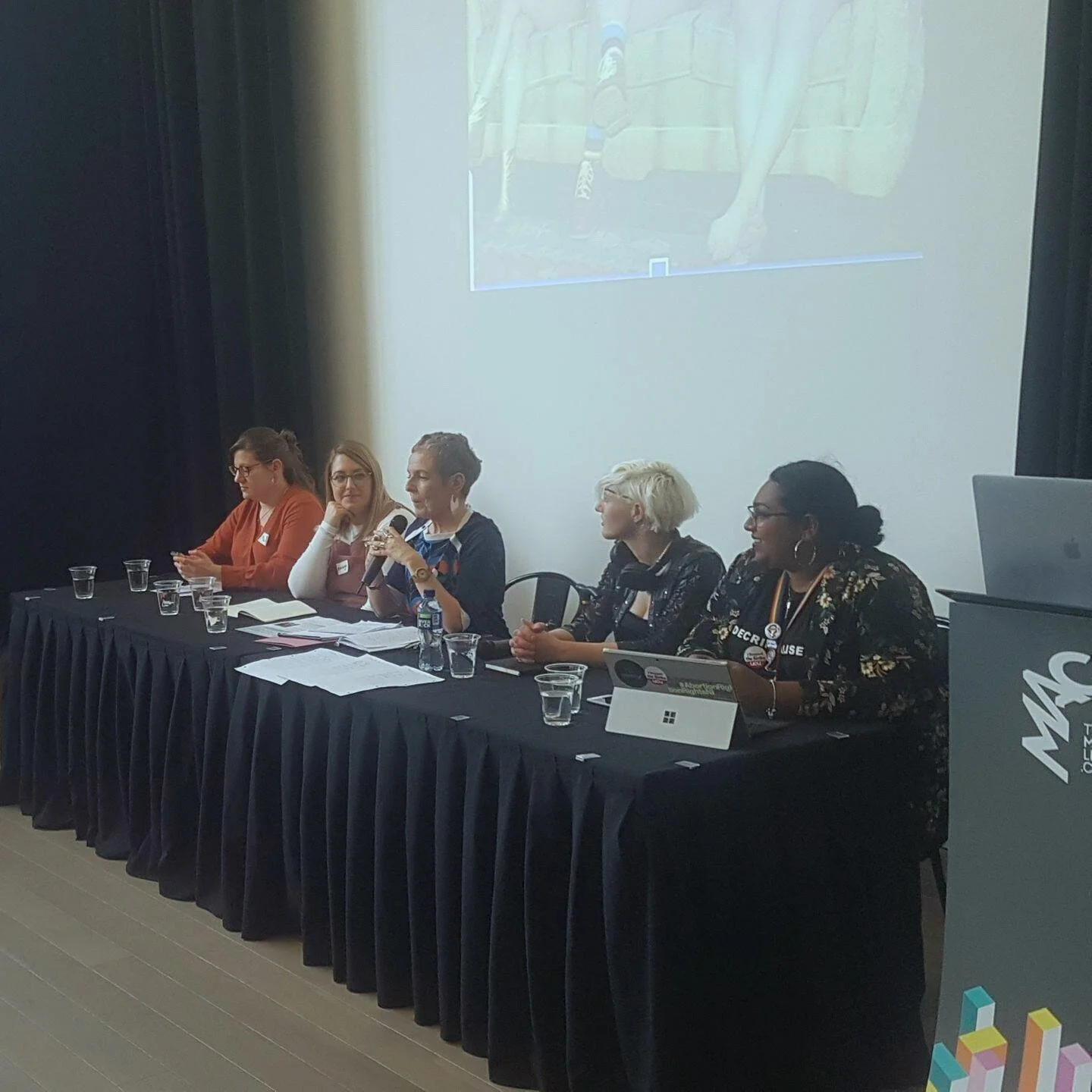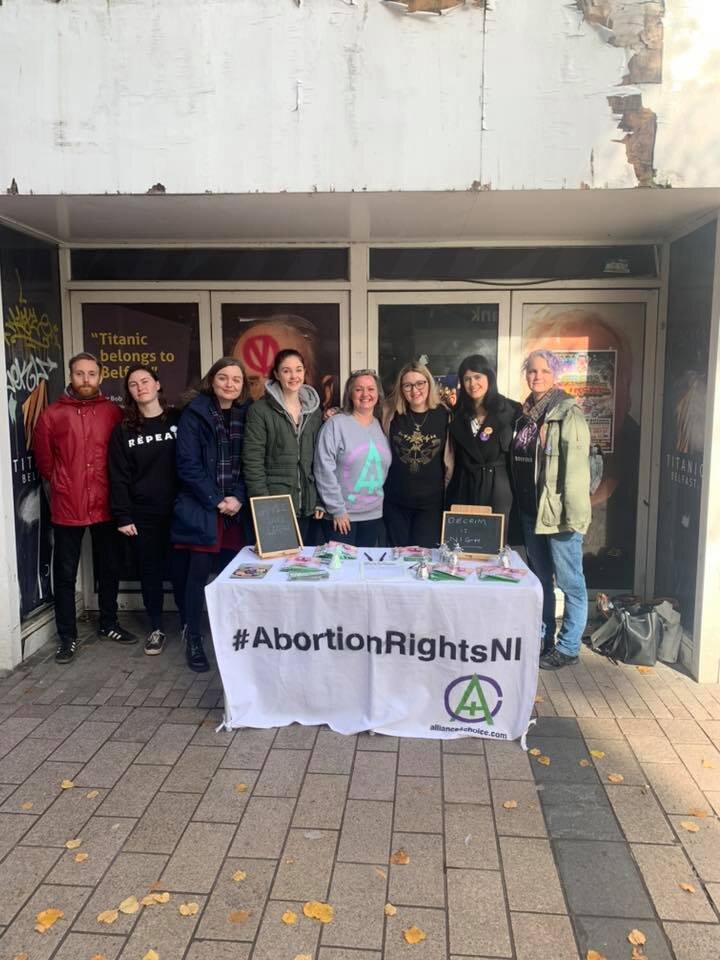October
In October there was a last ditch attempt by anti-choice MLAs to restore Stormont after nearly 3 years to block abortion access and marriage equality. We said Stop the Shenanigans, and celebrated as abortion was decriminalised. The NIO issued interim guidance for healthcare professionals who were able to start providing care.
November
In November the consultation for the abortion regulations opened, and we planned a series of Consultation Cafes to help people respond to the consultation and have their voices heard. Thanks to supporters we raised £10428.34 through Local Giving to run these events and produce information booklets on what the new law could mean.
December
Consultation Cafes continued into December, and we worked on the response from Alliance for Choice. We hosted the ‘Normalising Abortion’ conference where we came together to demonstrate our achievements over many decades in the struggle for reproductive rights and planned for what’s next.
January
Stormont returned and the New Decade New Approach deal was signed. Robin Swann became health minister. We also welcomed back the FPA with their new name Informing Choices NI.
February
In February we had a meeting along with friends in the women’s sector with Minister Walker and NIO staff. We told them in detail the shortcomings of the regulations, our concern at the creation of a new criminal offense for health care professionals, and our doubts that the wording was strong enough for the Health Department to be compelled to act. We were right, but they didn’t listen.
March
The regulations were published along with an explanatory note from the NIO. As expected the did not deliver the #FreeSafeLegalLocal abortion care we need. We launched our #ThisIsAnSOS campaign highlighting the flaws, and calling on the newly appointed secretary of state Brandon Lewis to uphold our human rights, as well as highlighting the need for telemedicine as Covid19 restrictions grew. A debate at Stormont proved to be a platform for anti choice rhetoric, but had no impact on the regulations.
https://www.alliance4choice.com/thisisansos
https://www.alliance4choice.com/news/2020/3/activists-across-the-island-call-for-emergency-measures-to-include-abortion-telemedicine
https://www.alliance4choice.com/news/2020/3/regulations-published-for-northern-ireland-abortion-provision-amidst-covid-19
https://www.gov.uk/government/consultations/a-new-legal-framework-for-abortion-services-in-northern-Ireland
April
the pandemic led to travel chaos, flights were cancelled and everyone was advised to #StayHomeSaveLives. Despite this the Minister for Health refused to commission abortion services, and the NIO repeatedly told us to travel to England for funded care. The only option for travel was an 8 hour overnight freight ferry, with no where to stay when you got there, and clinics struggling to provide services due to staff shortages caused by Covid.
Following a near tragedy when a woman was denied abortion care despite regulations being in place, Minister Swann and the executive brought in interim guidelines for early medical abortion up to 10 week. This did not included telemedicine, nor did it commission services. Informing Choices NI began operating the Central Access Point organising appointments at a limited number of providers.
May
Robin Swann continued to say abortion is a cross-cutting matter that needed to be approved by the whole executive, meaning that he would not commission services. Westminster advanced the regulations to the next stage which involved some minor amendments to language.
June
The regulations received their final approval at Westminster. At Stormont, The DUP brought a cynical motion attempting to limit abortion provision in the guise of disability rights, and Sinn Fein added an unhelpful amendment. The vote was non-binding and does not alter the Regulations. Figures were released from the UK Government to show that 1014 people travelled from NI to GB for an abortion in 2019.
July
The House of Commons published a briefing note on the regulations, nothing that There were 8 ‘terminations of pregnancy’ in hospitals in Northern Ireland in 2018-19 under the existing law, while 1,053 women travelled to England from Northern Ireland in 2018 for an abortion procedure under a scheme funded by the UK Government.
https://commonslibrary.parliament.uk/research-briefings/cbp-8909/
With the ongoing failure of the health department to commission abortion services, we started our Doula classes.
August
Responding to the DUP, the government representative Viscount Younger of Lecki said ‘the Government stands ready to provide whatever support and guidance we can to both the Northern Ireland Minister for Health and his department to assist them in progressing work to set up full abortion services as soon as possible, consistent with the Regulations.’ Despite this there were still no attempts to commission abortion services, with the DOH issuing a statement saying that commissioning of services would require a consultation, and cross party executive approval.
September
In September we celebrated Safe Abortion Day and the annual March For Choice digitally. The theme was #CareAtHome, which highlighted the need for the commissioning of abortion services, the fact people were still traveling, and the importance of telemedicine especially during the pandemic.
October
As a result of the lack of commissioning of services by the DoH, the Northern Trust was forced to pull services due to a lack of resources. In response to a question from Claire Bailey GPNI, Robin Swann maintained his position that while abortion is now legal, he believes he is not obliged to commission services. The DoH also issued a statement reiterating their position that any commissioning would require consultation, and executive approval. Despite the many barriers to abortion services, figures are released that show 664 people were able to access abortion in NI from April – September. It is not known how many ordered pills from Women on Web or Women Help Women, or how many continued to travel.
























